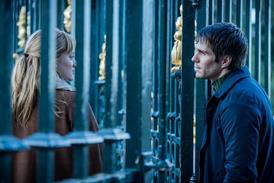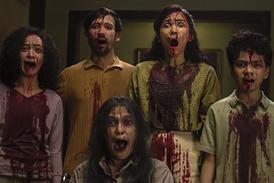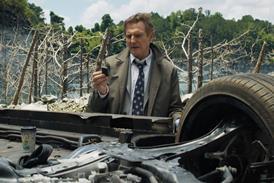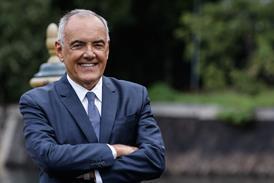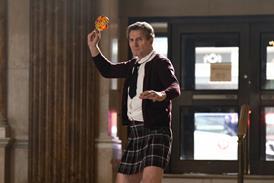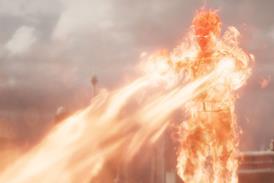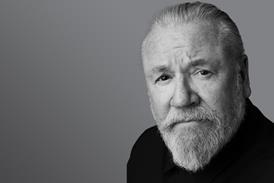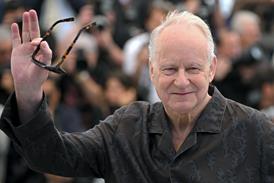Dir/scr. Marco Bellocchio. Italy/France/Switzerland, 2015. 107 min
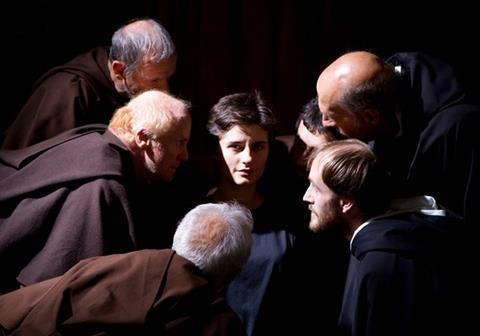
Blood Of My Blood is set across two time lines in the same Santa Chiara convent in the Northrn Italian town of Bobbio, home of director Marco Bellocchio’s forefathers and the setting for his celebrated first film, Fists in the Pocket (I Pugni in Tasca), 50 years ago.. Opening in the 17th century, it starts with a variation on the Joan of Arc trials (with the Dreyer classic echoing occasionally), starring his own son, Pier Giorgio Bellocchio, who also anchors the film’s modern-day strand about age-old corruption. Bellocchio himself concedes that this is not the kind of film which is easily explained, and as such this rarefied arthouse piece will play well to his fans and those who respond well to challenging cinema.
Life nonetheless triumphs in the film’s symbolic conclusion, one of the rare optimistic endings for a Bellocchio film.
A tough nut to crack for a casual viewer, Blood of my Blood blends together two genres Bellocchio has been so often associated with; the dark, moody operatic excesses of the first part, sustained by Carlo Crivelli’s score, and the light, grating and equally excessive irony of the modern day scenes. This is the kind of film which may breed controversy at home, and will undoubtedly be hailed by his admirers as a masterpiece.
The film opens with Federico (Pier Giorgio Bellocchio), a highly-strung soldier, being called into the venerable Santa Chiara convent and taken to the dungeons to help persuade a nun, suspected of having seduced his brother and driven him to suicide, to confess that she has signed a pact with the Devil. If she doesn’t confess, the late brother, who was a priest, will not be allowed burial in consecrated grounds.
The second part takes place today. A government official (Pier Giorgio Bellocchio again) tries to mediate the sale of the entire Santa Chiara convent to a Russian billionaire only to find himself up against the unholy alliance of old families, crooked politicians and the mafia. Ruled by an ancient, pale, sinister count (a stunning performance by Roberto Herlitzka) who leaves his hiding place in the convent’s prison only after sunset, this alliance has only one goal in mind – to keep the wheels turning so they can collect their slice of the corruption.
The first part of Blood of My Blood looks very much like another occasion for Bellocchio to settle his accounts with the Catholic Church. The present, on the other hand, is a sarcastic portrait of Italian society and its failure to deal with absurdity and fraud. But through both parts, and this is Bellocchio’s admirable achievement, he has life itself impetuously claiming its rights. It fails in the first episode, when the keys that could put an end to the nun’s cavalry are never used, and it fails in the present, when the modern personification of Dracula is not driven out of his castle. But it nevertheless triumphs in the film’s symbolic conclusion, one of the rare optimistic endings for a Bellocchio film.
As for the title, it has immediate justification not only in the blood relations between the characters in the film but also in Bellocchio’s casting decisions. Apart from his son, his daughter Elena appears in the second episode as a symbol of life bursting out in all its glory, and his brother, Alberto, wearing a Cardinal’s robe, marches majestically into the finale.
The rest of the cast, such as Alba Rohrwacher or Filippo Timi, are all very much in tune with the director – they may not be related by blood, but they have played in one or more of Bellocchio’s earlier films, which may explain their willingness to accept minor roles here.
Production companies: Kavac Film, IBC movies, RAI Cinema
International Sales: The Match Factory, info@matchfactory.de
Producers: Simone Gattoni, Beppe Caschetto
Cinematography: Daniele Cipri
Editing: Francesca Calvelli, Claudio Misantoni
Production design: Andrea Castorina
Music: Carlo Crivelli
Cast: Roberto Hertzlika, Pier Giorgio Bellocchio, Lidiya Liberman, Fausto Russo Alesi, Alba Rohrwacher, Francesca Fracassi, Alberto Cracco, Bruno Cariello, Toni Bertorelli, Filippo Timi, Elena Bellocchio, Patrizia Bettini, Sebastiano Filocamo, Alberto Bellocchio





